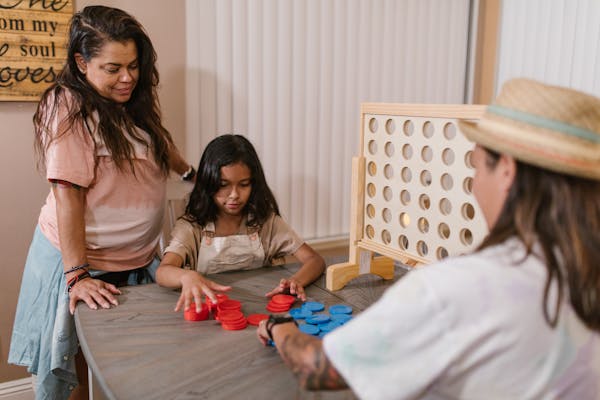
INDIANA – Growing up, and to this day, game nights have been a regular activity my family enjoys. Whether it is our annual “Game Day” in the winter season, where we all gather for a day of playing our favorite card and board games, or trying out new games together when visiting out-of-town family, playing games has been a fun way for my family to bond.
Reflecting on all the time my family has spent together playing games, I recognize how strongly it has impacted our relationships without us actually realizing it at the moment. Along with strengthening relationships, family game nights offer countless hidden benefits.
Focusing on the benefits for children, playing games strongly influences a child’s development. Playing games strengthens hand/eye coordination and fine motor skills. Games perfect for fine motor skills include Jenga, Operation, and any games involving rolling dice or shuffling cards.
When children play games, their grades are likely to improve. Games with academic elements can help students prepare for and excel in school. Examples of such games include Uno, Scrabble, and Chutes and Ladders.
Problem-solving is another developmental skill that can be improved by playing games. Certain games help with the growth of memorization skills as well as assisting children in solving problems on their own. Examples of games that promote problem-solving include Chess, Trouble, Connect 4, and Monopoly.

Additional game-playing benefits include growth in vocabulary and reading skills, building math skills, and encouraging strategic thinking. At school, motivation levels increase, and students have stronger relationships with their peers. Children learn how to take turns, develop patience, practice playing fair, follow the rules, and gain the ability to predict outcomes. Children can also develop good sportsmanship from watching their families win and lose.
Playing games has benefits for all members of the household. No matter how young a child is, they are positively impacted by this time together. Two- to three-year-olds have the skills for beginner games or to participate some, and infants enjoy the noise of conversation. Games promote family bonding through communication, working together, and making memories.
For adults, laughing and playing games can reduce stress and lower blood pressure though the release of endorphins. Not only are games a fantastic way to help children develop in all aspects of their lives, but spending this time together also creates unforgettable memories you will have forever.
While it can be challenging to fit playing games into the mix of work, sports practices, homework, school, and other family commitments, there are creative ways to make time. Some ideas include playing a game right after dinner, scheduling dates in advance, playing games at birthday celebrations, or even working on a ten-minute short game.
Grab a game, your family, and start your own family game night tradition The benefits will continue for a lifetime.

Beth Thomas, MSW, LSW, is a Youth First Mental Health Professional at St. Joseph Catholic School in Gibson County and St. Bernard Catholic School in Spencer County. Youth First, Inc., is a nonprofit dedicated to strengthening youth and families. Youth First provides over 100 highly trained mental health professionals (primarily master’s level social workers), prevention programs, parent engagement coordinators, and bilingual support personnel to 126 schools across 14 Indiana counties. Over 53,000 youth and families per year are served by Youth First’s school-based social work and community programs that promote mental health, prevent substance misuse, and maximize student success. To learn more about Youth First, visit youthfirstinc.org or call 812-421-8336.



